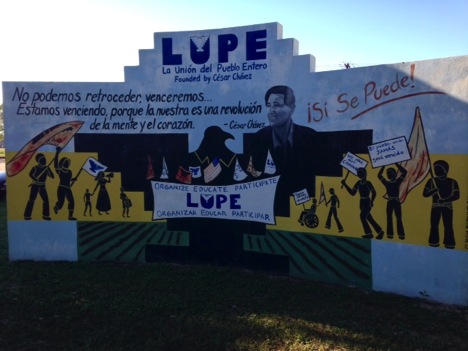Keeping our promises
October 28, 2013 3 Comments“We can’t retreat, we will win… We are winning because our revolution is one of the mind and the heart.” César E. Chávez
During a visit to LUPE, the community union founded by César E. Chávez and the United Farm Workers, Annie E. Casey Foundation’s Partner Organizations of Color explored the connections between child welfare, juvenile justice, community organizing and immigration. One participant spoke a word of caution to capacity builders and organizers who seek to engage and mobilize community residents. “We can’t be another broken promise to the people.”
As we design and facilitate processes through which people who are most affected by the pressing issues of our day can make change, I believe we hold an almost sacred responsibility to make those experiences worthy of the hope that people invest in them. I’ve been thinking about this a lot recently as I struggle with processes that are “better than the standard way of doing business” because they attempt to engage people who are most on the margins, but are still far from having the decisions be driven by those most affected. I have found myself struggling with how to deal with the constraints of such processes without breaking that sacred promise to create spaces where people can speak their truths powerfully and pursue the changes they think are most important. Sometimes I’m caught between wanting to make such a process “as good as it can be under the circumstances” and wanting to walk away because “as good” may not be good enough.
How are you, as capacity builders, facilitators, network builders or organizers wrestling with this challenge? How do you hold yourself accountable? Have you ever walked away from a project because it seemed more of a promise-breaker than anything else?

3 Comments
You are speaking right to the bind we find ourselves in Cynthia. I feel like most of the time this “better than the standard” is a really good gift to bring. But the essence of your question is the nut we have to crack.
I often grapple with the question of “what are the conversations that people actually want to have?” Because it seems that when we try to bring in those who are at the margin, we are bringing them into a construct that is very clearly pre-determined, even if it is a construct of justice and inclusion.
Thank you for this post, Cynthia! I like the way you are framing this as an “almost sacred responsibility” and walking away from “promise-breakers.” Really helpful. I often wonder about those spaces we are facilitating that are mostly not folks on the margins as well – how to help guide those conversations in a way that helps folks to leverage their privileges (organizational, positional, political, as well as identity-based) most appropriately toward true justice…which ideally would include helping these folks see how they can help move more decision making authority to the margins.
The questions ring very true for me. There are ways we
follow tempting new possibilities that are more the gloss than the trueness of an engaged process.
As I first read this, examples came to mind from my years
doing youth work—when, for example, were the times when adults were not truly seeing youth leaders as their peers and yet we proceeded as if they were?
And then I heard a sermon on the radio Sunday in which the
preacher was talking about how intimacy is hard, and holy. That phrase made me recalibrate and think about the intimate side of breaking promises.
It made me think of how I can make promises to my colleagues. While the values may be more aligned than in your
queries about questionable community work, the erosion of trust if things are not delivered on time or if the values are not fully lived is real.
And then still closer are our loved ones. I have seen the real pain of families breaking promises, both as a child and as a parent. And then there are the promises I make to myself and how I can break that sacred trust too easily, often supposedly in deference to others.
Maybe one root is starting close to home — trying to be fully
engaged and more truthful to myself, my loved ones and my colleagues as a path to being more truthful in the world.